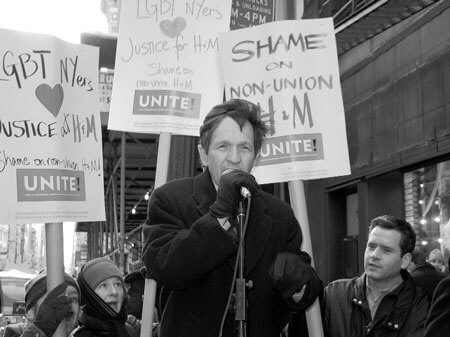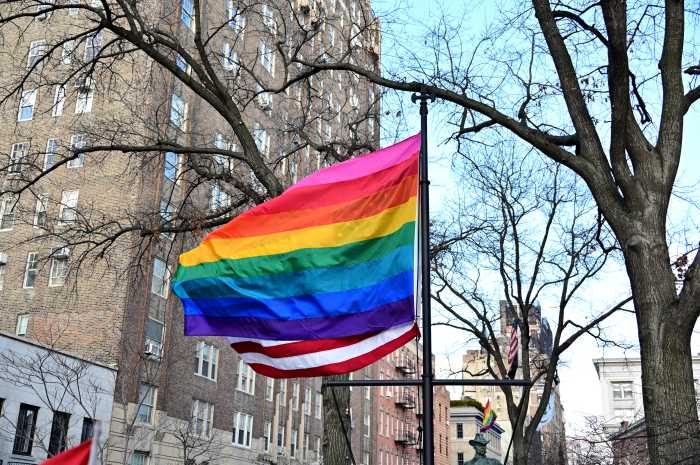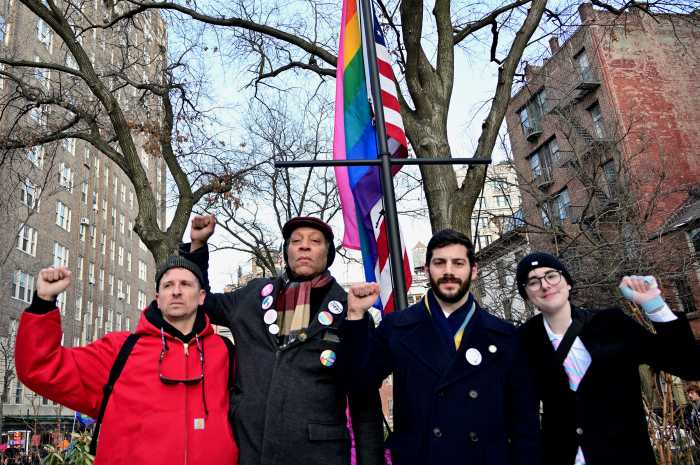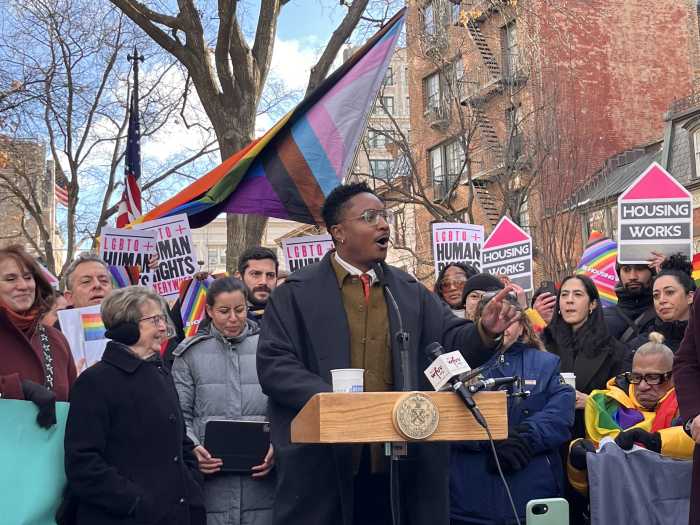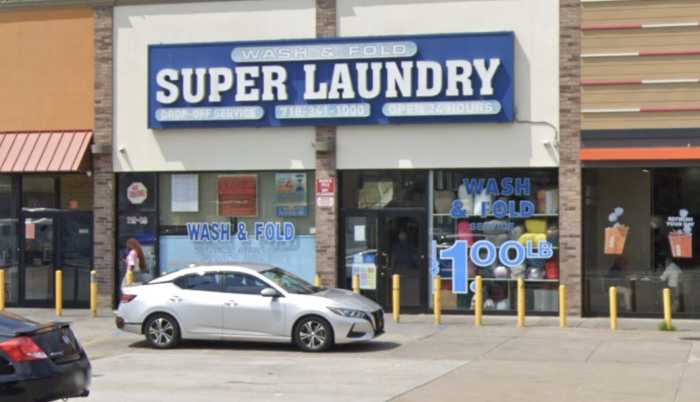Presidential hopeful, an Ohio representative, says he stands out from the crowd
Standing with Labor
Dennis Kucinich, flanked by GLID’s president, Brad Hoylman (r), at UNITE protest against H&M in SoHo on Sunday, December 7. Pamela Doan
Just three days before the Gay and Lesbian Independent Democrats (GLID) gave its 2004 presidential endorsement to former Vermont Governor Howard Dean, the Manhattan-based club played gracious host to Dennis Kucinich, the U.S. representative from Ohio, who in a gentle, but insistent manner declared that for Americans seeking a progressive choice next year, he is the genuine article.
“I want to create the opportunity for America to heal in a profound way by extending to the community of lesbian, gay, bisexual, and transgendered persons the right to be able to marry someone of the same sex,” Kucinich said to enthusiastic applause from a crowd of roughly 75 in opening his remarks at the LGBT Community Center on December 7. “As the Democratic nominee, I will have no hesitation whatsoever to move away from divisiveness and to challenge those who would attempt to judge this community.”
Same-sex marriage rights was among three issues––healthcare and his opposition to the war in Iraq were the other two––on which Kucinich focused on during his presentation, and on each he argued that he has staked out positions that distinguish from the Democratic race’s leading candidates.
Kucinich, Rev. Al Sharpton, and former Illinois Senator Carol Moseley Braun are the three candidates among the nine Democrats seeking their party’s nomination who have voiced unequivocal support for equal same-sex marriage rights. The six other candidates support varying versions of civil union and domestic partnership rights, though Dean, who signed the nation’s first and only civil union law in Vermont in 2000, said at a July debate sponsored by the Human Rights Campaign that he is in favor of federal government recognition of same-sex marriage sanctioned elsewhere, whether in Canada or Massachusetts. Dean also said he favored repeal of the 1996 Defense of Marriage Act.
Asked in an interview after the GLID forum about the reluctance of most of his competitors to go as he has on the marriage issue, Kucinich couched in terms of political mettle.
“The idea of being fearful of this issue, running away from it because you think George Bush is going to use it as a wedge issue––the pursuit of the White House should not be for the faint of heart,” he told Gay City News. “This is a moment in American history when people are waiting for courage. They may not even agree with the leader’s position, but they want to see courage.”
On health care, Kucinich talked about how most of the other Democrats aim at incremental change to the existing system, while he favors Canadian-style, single-payer universal coverage.
“Insurance companies do not make money providing health care, they make money not providing health care,” he declared to widespread chuckles among the GLID crowd. “Most people ask, my God, how are you going to pay for that? Well you know what––we’re already paying for it.”
During the interview afterward, Kucinich called healthcare “a defining issue in this race,” and said that the plans of other leading Democrats—he mentioned Dean, Massachusetts Senator John Kerry, and Rep. Richard Gephardt of Missouri by name—would leave millions of people without protection.
“The for for-profit health care system is a corrupt system,” he said. “It’s rationing health care based on the ability to pay, and if a president of the United States isn’t ready to make a fundamental challenge to this system, why even run?”
Kucinich addressed the Iraqi war issue only indirectly in his talk, in extensive comments about his proposal for a federal department of peace that would address not only the international scene, but also hope domestically to make “nonviolence an organizing principle of our society,” by challenging domestic violence, hate crimes and tension between police and communities. However, in the interview afterward, he asserted that he is the only Democrat running for president with “a plan to end the occupation of Iraq.”
“Gov. Dean, for example, has been quoted on his website as saying that American troops could be there for another two years, and that is not acceptable,” Kucinich said. “I’m stating––bring our troops home.”
Noting that Dean had opposed the war, unlike others such as Kerry and Gephardt, Kucinich nevertheless drew a firm distinction between the former Vermont governor and himself on the issue of what to do now.
“It’s one thing to say you were against the war,” he said. “But you know if it was wrong to go in, it is wrong to stay in.”
Kucinich said that his campaign website details a plan for bringing U.S. troops home within 90 days of winning a United Nations resolution for sharing the burden of restabilizing Iraq.
“The U.S. troop presence in Iraq is actually a cause of instability , not stability,” he asserted. “It’s a recruiting poster for Al Qaeda. It’s increasing the cycle of violence. It has created conditions where we are separating ourselves from the rest of the world.”
Kucinich and Dean are the only two Democratic candidates to have add-ressed GLID this year. In 2000, both of the Democratic hopefuls, former Vice President Al Gore and former New Jersey Senator Bill Bradley, made high profile visits to GLID at the Center.
After his appearance at the Center, Kucinich joined members of GLID and activists from UNITE, the clothing production, distribution, and retail union, who were protesting at the planned grand opening of a H&M store in SoHo. UNITE charges that the Swedish retail giant, which is covered by union contracts in its European operations, is battling unionization efforts at its U.S. distribution center in New Jersey and subcontracts with sweatshops in Asia that pay below the minimum wage in their home countries. According to a press release from UNITE, hundreds turned out for the SoHo protest, and the store delayed its grand opening.

